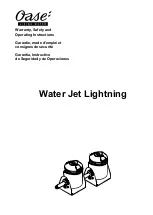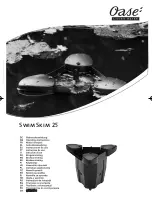
Laars Heating Systems
Page 26
SECTION 8.
Trouble Shooting
8.1 Resolving Lockouts
There are many causes of lockouts. The three
most common causes are: (1) inadequate gas supply,
(2) poor combustion, (3) ignitor failure.
1. Inadequate gas supply: Before proceeding,
ensure that the gas supply has not been shutoff
or the LP tank (LP water heaters) is not empty.
Then, restart the water heater and observe the
operational cycle. After a 15-second fan pre-
purge, the ignitor will heat up for 40 seconds,
and then the unit will light. If it does not, check
the gas supply pressure to the appliance, after
resetting the appliance and attempting another
start-up. The gas pressure to the appliance
must be above 5 in. w.c. (1.2 kPa) throughout
the entire start-up cycle. If it is not, correct the
supply problem (check gas valves or supply
piping). If the supply pressure is adequate,
consult the factory for assistance.
2. Poor Combustion: Poor combustion should
be suspected if there is a strong flue gas odor.
The odor may result from an improper gas/air
ratio (high or low O
2
or CO
2
). Mighty Stack
appliances operate best with 45% excess air (8%
CO
2
on natural gas, 9.2% CO
2
on LP). Check the
CO
2
of the appliance and adjust if necessary.
3. Ignitor failure: If the water heater goes through
a normal start cycle but combustion does not
occur, ignitor failure should be suspected. Check
the ignitor by unplugging the ignitor plug and
measuring the ignitor resistance. It should be
50-80 ohms. If the resistance is not 50-80 ohms,
replace the ignitor. If the resistance is correct,
reset the water heater and check for 120 VAC at
the ignitor plug during the start cycle. If there is
no voltage, replace the faulty ignitor wire harness
or the ignition control.
8.2 Delayed Ignition — Possible Causes
A defective burner can cause a delayed ignition.
If the gas supply pressure is proper and the gas
valves are functioning properly, then burners should
be inspected. There should be no distortion or
perforations in the burners outside of the active burner
port area. Replace if indicated.
8.3 High Gas Consumption
Appliances operating with an improper air/
fuel ratio are very inefficient and consequently, have
very high gas consumption. Because efficiency is
high when the CO
2
is high (or O
2
is low), appliances
operating with low CO
2
or high O
2
(especially LP
appliances) consume more gas. Adjust the CO
2
or O
2
for optimum efficiency. If no combustion analyzing
equipment (CO
2
or O
2
) is available then a proper
adjustment of the air/fuel ratio (CO
2
or O
2
) cannot be
accomplished. The CO
2
should be 8% at high fire for
natural gas and 9.2% at high fire for LP. To check the
CO
2
, first verify that the supply gas pressure is within
5 to 13 in. w.c. (1.2 to 3.2 kPa). With the Mighty Stack
running with all stages firing, set the air box pressure
to 1.8 in. w.c. (0.42 kPa) (as a starting point), by
adjusting the air shutter(s) at the intake of the fan(s).
Check the CO
2
, and adjust the air shutters if further
adjustment to the CO
2
is needed.
Size
20°F
25°F
30°F
35°F
flow
gpm
H/L
feet
flow
gpm
H/L
feet
flow
gpm
H/L
feet
flow
gpm
H/L
feet
199
17
1.6
14
1.0
11
0.7
10
0.5
300
26
3.5
20
2.3
17
1.6
15
1.2
399
34
6.3
27
4.0
23
2.8
19
2.1
Metric Equivalent
Size
11°C
14°C
17°C
19°C
flow
lpm
H/L
m
flow
lpm
H/L
m
flow
lpm
H/L
m
flow
lpm
H/L
m
199
64
0.5
51
0.3
43
0.2
37
0.2
300
97
1.1
77
0.7
64
0.5
55
0.4
399
129
1.9
103
1.2
86
0.9
74
0.6
Notes:
gpm = gallons per minute, lpm = liters per minute,
H/L = head loss, ft = head loss in feet,
m = head loss in meters.
Maximum temperature rise is 35°F (19°C), as shown.
Head loss is for water heater’s heat exchanger only.
N/R = not recommended.
Table 8. Water Flow Requirements.
For troubleshooting purposes, Table 8 gives preferred
flow rates between the tank and heater. The heater is
designed for between 20° and 30°F temperature rise.
Summary of Contents for Mighty Stack MS-080
Page 14: ...Laars Heating Systems Page 14 Figure 4 Venting...
Page 19: ...Mighty Stack Page 19 Figure 7 Wiring Diagram ON OFF Water Heater...
Page 30: ...Laars Heating Systems Page 30 Figure 9 Combustion Chamber Components...
Page 31: ...Mighty Stack Page 31 Figure 10 Jacket Components...
Page 32: ...Laars Heating Systems Page 32 Figure 11 Heat Exchanger Components...
Page 33: ...Mighty Stack Page 33 Figure 12 Gas Train Components...
Page 34: ...Laars Heating Systems Page 34 Figure 13 Control Panel Components...
Page 35: ...Mighty Stack Page 35 Figure 14 Pump Assembly Components...











































